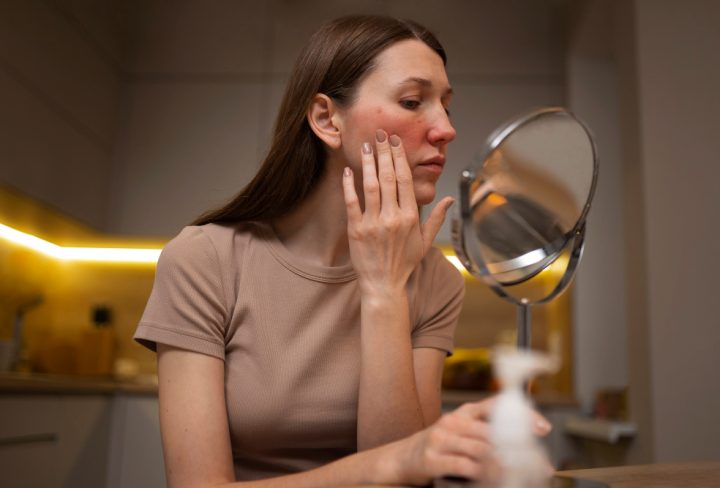Rosacea is a common skin issue that makes faces red and can affect how people feel about themselves. It often hits adults between 30 and 60 years old. You might notice it on cheeks, noses, foreheads, and chins. While it’s more known among fair-skinned folks, it’s crucial to spot it in every skin type because darker-toned skin often doesn’t get diagnosed as much. Rosacea skin care is essential for everyone.
Realizing you might have rosacea and seeing a skin doctor soon can really help keep it in check.
Identifying Rosacea Symptoms and Triggers
You might notice persistent redness on the face if you have rosacea. Sometimes veins show up visibly, and the skin could get bumpy or thicken, especially on the nose. More than half of the people with rosacea experience issues with their eyes being red or irritated.
Knowing what sets off rosacea can really help. Common triggers include:
- Too much time in the sun
- Eating spicy foods
- Being stressed
- Drinking alcohol
- Using certain skincare products
Also, changes in weather, particularly hot or humid conditions like those in India, might worsen the symptoms.
Exploring Effective Rosacea Treatments
Even though there isn’t a cure for rosacea, there are ways to help manage it and prevent symptoms. You can use medications that you rub on or take by mouth to reduce redness and swelling. More advanced options like laser therapy can help minimize those vein marks and the redness.
It’s crucial to have a personal rosacea skin care routine. This often includes gentle products and always wearing sun protection to keep the skin safe.
Lifestyle and Dietary Changes for Managing Rosacea
Finding out what makes your rosacea act up and staying away from those things is key. Changing your lifestyle can also help a lot. Things like managing stress better and eating a balanced diet are important.
In India, natural remedies are popular, like using neem and turmeric in face care for rosacea because of their calming effects. Rosacea therapy can go beyond just medical treatments.
Moreover, dealing with the emotional and social effects of rosacea is crucial. Finding support can make a huge difference for those affected.
Offer support and resources that can guide people in feeling better about their skin condition.
Key Highlights on Managing Rosacea:
- Recognize symptoms early, including those that might not show clearly on darker skin.
- Be mindful of triggers like sun and stress that can worsen the condition.
- Consult with dermatologists and consider multiple rosacea redness treatments.
- Opt for gentle rosacea skin products and protective habits.
- Explore lifestyle changes, including nutrition and natural remedies, to ease symptoms.
- Address the psychological aspects and seek community support for emotional wellness.
Understanding rosacea can lead to a calmer and happier life. With the right approach, anyone can manage their symptoms effectively. Keep learning, adapting, and consulting professionals to find what works best for your skin.

